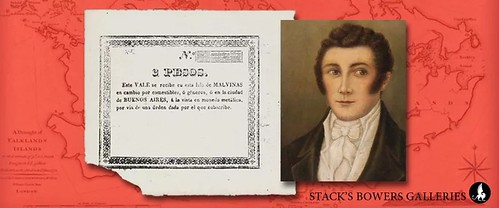
PREV ARTICLE
NEXT ARTICLE
FULL ISSUE
PREV FULL ISSUE
ARGENTINE-FALKLAND ISLANDS PAPER MONEYStack's Bowers Director of Consignments & Senior Numismatist Dennis Hengeveld published this article about paper money from Argentina's administration of the Falkland Islands in the firm's Paper Money of the Week column. -Garrett Few pieces of paper money offer as direct a link to a specific and controversial moment in geopolitical history as the currency from the Argentine administration of the Falkland Islands, or "Islas Malvinas" as they are called in Spanish. Issued under the authority of Luis Vernet, a German-born entrepreneur who led a Buenos Aires-backed settlement on the islands during the 1820s, this note belongs to a fleeting but highly significant chapter in the South Atlantic. Vernet's colony, centered at Puerto Soledad, was developed with both private capital and official sanction from the United Provinces of the Río de la Plata, and it was intended as a permanent foothold in a region claimed by multiple empires. By the time Vernet was appointed Civil and Military Commander in 1829, the settlement was functioning with a civilian population composed of gauchos, foreign laborers, enslaved workers, and families, sustained through a modest economy based on sealing, fishing, and livestock herding. The creation and circulation of paper currency were part of a broader effort to formalize and stabilize economic life within a remote and often self-reliant community. With coinage difficult to obtain and barter still common, a localized paper currency provided a practical solution. Vernet sought to impose regulatory order as well, including a controversial system of exclusive sealing rights, which brought him into direct conflict with American commercial interests in the region. In 1831, after Vernet's forces detained several U.S. sealing vessels for violating these restrictions, the United States responded by sending the USS Lexington. The ship's crew dismantled the settlement's defenses and evacuated a large portion of its population, effectively ending Argentine control over the islands. Though Buenos Aires continued to assert sovereignty in the following years, it was never able to reestablish its authority. This episode did not take place in a vacuum. Vernet's venture built on a long and complex history of competing colonial claims in the Falklands. The first permanent European presence was established by France in 1764 at Port Louis on East Falkland. Spain, asserting sovereignty over the region based on both papal authority and proximity to the South American mainland, took over French holdings in 1767 (for appropriate compensation) and renamed the settlement Puerto Soledad. A few years earlier, Great Britain had founded a settlement on West Falkland at Port Egmont in 1765. The resulting diplomatic tensions nearly led to war in 1770. A compromise was reached, Britain withdrew its personnel in 1774 due to financial pressures, but left behind a plaque affirming its claim. Spain retained a garrison at Puerto Soledad until 1811, when it was withdrawn as the Spanish Empire in South America largely collapsed, with nations gaining their independence. The islands then remained unoccupied for nearly a decade, until the newly independent Argentine government began making moves to reclaim and settle them in the early 1820s. Before Vernet's successful attempt, an earlier Argentine expedition had raised a flag and made a symbolic claim under the command of Colonel David Jewett in 1820, but no permanent settlement resulted. By contrast, Vernet's colony took root, and by the late 1820s, a functioning local economy was in place, supported by government recognition and internal regulations. Vernet issued four denominations of paper money during this time, in 1, 2, 5, and 10 Pesos denominations, which he personally signed upon issuance. These notes were likely used in daily transactions within the settlement and among workers employed in sealing and livestock operations, all of which were organized under Vernet's oversight. The collapse of the settlement after the Lexington raid marked the end of Argentine control. In early 1833, a British naval vessel arrived at Port Louis and requested the withdrawal of the remaining Argentine officials. British administration was restored and became permanent with the establishment of a colonial government by 1840. Vernet, who had traveled to London to recover compensation, ultimately lost his influence. The notes he issued, however, remain among the few surviving artifacts from this transitional period. One interesting historical tidbit related to these notes is that when Vernet traveled to London, he was eventually awarded 2,400 Pounds Sterling as compensation. However, of that amount, he received just 1,850 Pounds Sterling. The balance was used to pay off these promissory notes, many of which must have still been around at the time, although now, surviving examples are very rare in any format. In our upcoming 2025 Global Showcase Auction, we will offer a remainder from the Vernet issue of paper money. This undated 2 Pesos is graded Choice Extremely Fine 45 NET, with comments for a missing corner and minor rust. Though simple in appearance, it is a powerful numismatic artifact that speaks to the contested history of the Falkland Islands. Extremely rare, this will be the first time we offer a note from the ‘Isla de Malvinas,' and the first opportunity for collectors to acquire a note from here in many years. While the consignment deadline for the 2025 Summer Global Showcase Auction has passed, we are always seeking quality material for upcoming auctions. To capitalize on this robust market and showcase your notes in a standout catalog, please contact me directly at Dennis@stacksbowers.com or call 800-458-4646.
To read the complete article, see:
To read the complete item description, see:
Wayne Homren, Editor The Numismatic Bibliomania Society is a non-profit organization promoting numismatic literature. See our web site at coinbooks.org. To submit items for publication in The E-Sylum, write to the Editor at this address: whomren@gmail.com To subscribe go to: Subscribe All Rights Reserved. NBS Home Page Contact the NBS webmaster 
|

